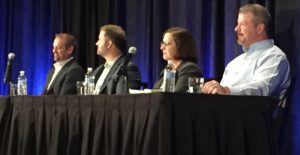Inside Supply Management Magazine
The Supply Management Learning Process Never Stops

As managers or directors selected to answer college students’ questions for a session at UPMG2018, Institute for Supply Management®’s utility conference, it could be said that the four panelists for “Leadership Forum: How to Build a Successful Career in Supply Chain” have done exactly that.
However, in a ballroom at the JW Marriott Desert Ridge Resort & Spa in Phoenix on Tuesday, the quartet — Tim Coughlin, principal manager at Southern California Edison; Bryan Fox, CPSM, supply chain operations director at KCP&L and Westar Energy; Robert Kunze, strategic sourcing manager at Excel Energy; and Nadine Wiese, senior manager of material availability/T&S supply operations at ComEd — stressed that the knowledge and traits that brought them up the career ladder constantly need to be added to and refined.
“What got you where you are won’t get you where you want to be,” Wiese said.

(From left) Robert Kunze, Tim Coughlin, Nadine Wiese and Bryan Fox, CPSM
As supply chains become more complex, technologies more disruptive and analytics more advanced, Coughlin says, continuous learning is not an option. And having the patience to wait for the necessary information is one of his biggest challenges on the job.
At a smaller organization early in his career, Coughlin could walk down the hall to find the right subject matter expert (SME). At Southern California Edison, a company with 12,000 employees, the process is much more complex: “It might be weeks before you find the SME, and it could be a few days after that when you can have a meeting,” Coughlin says. “The breadth of people in the conversation is much wider, and that takes some getting used to.”
Fox identified three skills that are critical for emerging procurement professionals to develop: (1) problem solving — taking initiative and not waiting to be told what to do; (2) communication — being flexible and not argumentative; and (3) interpersonal skills. “Those hard interpersonal skills are usually what get your foot in the door,” Fox said. “The soft skills — how you deal with people, you emotional IQ, change management — are what get you promoted or fired.”
Kunze said that, for young practitioners, leadership development is as important to work on as any technical skill. “That first supervisor of manager job we got, chances are we got it because we were good at what we did technically or functionally,” he said. “Suddenly, we were promoted into management, and some of us hadn’t had any leadership training along the way. And we made some mistakes as a result. … Leadership training and accountability make it easier when you have to step in and start offering guidance.”
Wiese says leadership-development responsibility goes beyond individuals, adding that it’s incumbent on organizations to groom next generation of supply management. “We can’t wait until all the baby boomers have walked out the door to start asking who the next leaders are,” she said. “We have to identify potential new leaders, determine the skill sets they need, and make sure they have the tools to develop them.”
Much of that critical training will involved technology. Fox held up his smartphone, noted that it is more powerful than the Apollo spacecraft systems that took astronauts to the moon and back, and added that the vast advances in technology in the last 10 years will be even more so over the next 10. Tapping into such technologies as the Internet of Things, understanding advanced analytics and effectively deploying a mobile workforce are among procurement’s looming digital challenges.
While discussing the evolution of technology, Fox mentioned pagers. That led session moderator Markley Ward, contract services director at AMS-PAR, to quip: “Can anyone explain to our (college) students what a pager is?”


